Contractors in Iraq and Afghanistan
published by JL Dunn on 04/07/11 4:06pm
Posted to:
Excerpts from Congressional Research Service’s “The Department of Defense’s Use of Private Security Contractors in Afghanistan and Iraq: Background, Analysis, and Options for Congress” dated 2/21/11 by Moshe Schwartz
Located here: http://www.fas.org/sgp/crs/natsec/R40835.pdf
As of December 31, 2010, there were more than 27,000 private security contractor personnel in Afghanistan and Iraq, representing 17% of DOD’s total contractor workforce in Afghanistan and Iraq. Since December 2009, the number of PSC personnel in Afghanistan has exceeded the number in Iraq.
In Afghanistan, as of December 2010, there were 18,919 private security contractor personnel working for DOD, the highest number since DOD started tracking the data in September 2007. The number of PSC personnel in Afghanistan has more than tripled since June 2009.
In Iraq, as of December 2010, there were 8,327 private security contractor personnel working for DOD, down from a high of 15,279 in June 2009.
....according to the Department of Defense (DOD), as of December 2009, there were 11,095 PSC employees in Iraq, of which 1,664 (15%) provided unarmed services. This figure does not include contractors, armed or unarmed, who trained security forces, analyzed intelligence, or conducted interrogations.
Peter Singer of the Brookings Institution estimated that citizens of some 30 countries have worked as security contractors in Iraq. PSC employees are generally divided by nationality into three groups:
1. U.S. nationals,
2. Third-country nationals, and
3. Local nationals.
In Iraq there are 100 PSCs registered and licensed (or in the process of renewing their license) with the Ministry of Interior (72 Iraqi companies and 28 foreign companies). These PSCs employ more than 30,000 armed employees working for a variety of government and private sector clients. The number of Iraqi PSCs has increased over the past two years. According to some analysts, the primary clients for non-Iraqi PSCs have shifted dramatically over the past two years from working for the U.S. government to working for private industry (such as international oil companies) and non-governmental organizations.
In Afghanistan, there are currently 52 PSCs licensed to operate with some 30,000 registered security contractors. PSCs operating in Afghanistan are limited to 500 employees and can only exceed 500 with permission from the Cabinet. Because of the legal restrictions placed on security companies in Afghanistan, a number of PSCs have operated without a license or have exceeded the legal limit, including security contractors working for NATO and the U.S. Government. Many analysts believe that regulations governing PSCs are only enforced in Kabul; outside Kabul there is limited government reach at present and local governors, chiefs of police, and politicians run their own illegal PSCs. Estimates of the total number of security contractor personnel in Afghanistan, including those that are not licensed, are as high as 70,000. The majority of these PSCs do not work for the U.S. government. In recent months, the Karzai government has sought to decrease the number of PSCs working in Afghanistan, and has claimed to have shut down a number of unlicensed companies.
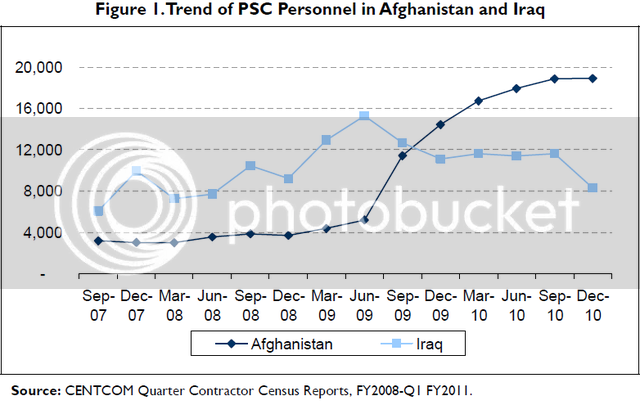 AFGHANISTAN CONTRACTORS
According to DOD, as of December 2010, there were 18,919 private security contractor personnel in Afghanistan. This represents the highest recorded number of private security contractor personnel used by DOD in any conflict in the history of the United States.
AFGHANISTAN CONTRACTORS
According to DOD, as of December 2010, there were 18,919 private security contractor personnel in Afghanistan. This represents the highest recorded number of private security contractor personnel used by DOD in any conflict in the history of the United States.
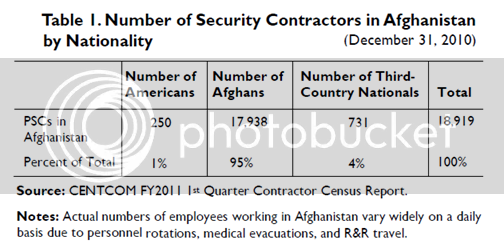 From December 2008 to December 2010, the number of U.S. troops and DOD contractor personnel in Afghanistan increased. However, the number of security contractors increased at a much faster rate (413%) than total contractors (22%) or troop levels (200%). As of December 2010, security contractor personnel made up 22% of all DOD contractors and was equal to 20% of the size of total U.S. troop presence in Afghanistan (see Figure 3).
From December 2008 to December 2010, the number of U.S. troops and DOD contractor personnel in Afghanistan increased. However, the number of security contractors increased at a much faster rate (413%) than total contractors (22%) or troop levels (200%). As of December 2010, security contractor personnel made up 22% of all DOD contractors and was equal to 20% of the size of total U.S. troop presence in Afghanistan (see Figure 3).
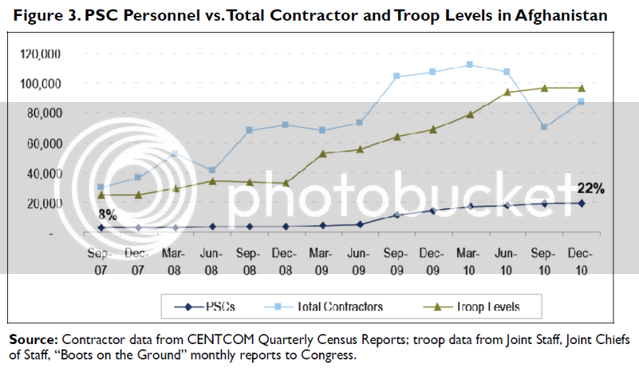 According to DOD, from June 2009 to November 2010, 319 private security contractor personnel working for DOD have been killed in action in Afghanistan, compared to 626 U.S. troops killed in action over the same period. Adjusting for the difference in the number of PSC personnel compared to troops, a PSC employee working for DOD in Afghanistan is 2.75 times more likely to be killed in action than uniformed personnel (see Figure 4).
More contractor security personnel were killed in action providing mobile security (233 people or 73% of fatalities) than static security, even though those providing mobile security are only 25%- 30% of the total PSC workforce.
According to DOD, from June 2009 to November 2010, 319 private security contractor personnel working for DOD have been killed in action in Afghanistan, compared to 626 U.S. troops killed in action over the same period. Adjusting for the difference in the number of PSC personnel compared to troops, a PSC employee working for DOD in Afghanistan is 2.75 times more likely to be killed in action than uniformed personnel (see Figure 4).
More contractor security personnel were killed in action providing mobile security (233 people or 73% of fatalities) than static security, even though those providing mobile security are only 25%- 30% of the total PSC workforce.
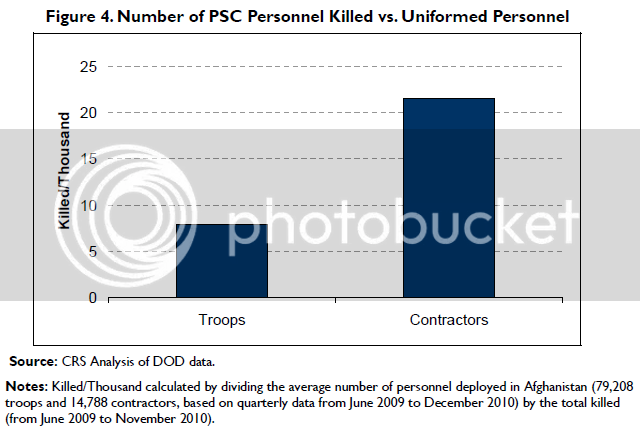
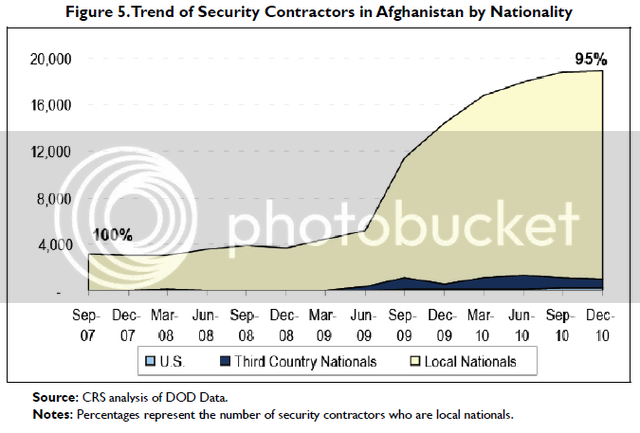 IRAQ CONTRACTORS
According to DOD, as of December 2010, there were 8,327 private security contractor personnel working for DOD in Iraq - the fewest number of such personnel since June, 2008. Local nationals made up just 1% of all security personnel, compared to 95% in Afghanistan (see Table 2).
IRAQ CONTRACTORS
According to DOD, as of December 2010, there were 8,327 private security contractor personnel working for DOD in Iraq - the fewest number of such personnel since June, 2008. Local nationals made up just 1% of all security personnel, compared to 95% in Afghanistan (see Table 2).
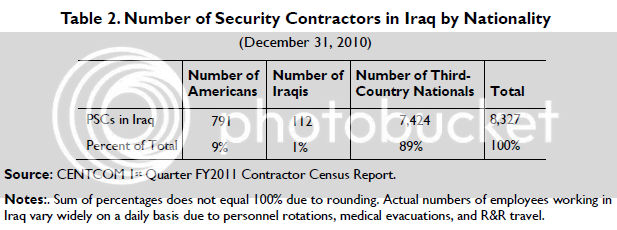 As the military continues to withdraw from Iraq, the Department of State will assume greater responsibility for providing security and will have to hire more PSC personnel. It is estimated that the number of security contractors working for State will increase to approximately 5,500, with some 1,500 providing personal security for diplomatic movements and an additional 4,000 providing perimeter security.
As the military continues to withdraw from Iraq, the Department of State will assume greater responsibility for providing security and will have to hire more PSC personnel. It is estimated that the number of security contractors working for State will increase to approximately 5,500, with some 1,500 providing personal security for diplomatic movements and an additional 4,000 providing perimeter security.
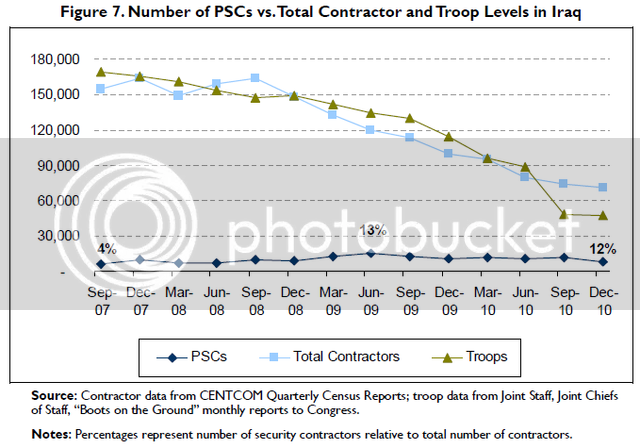
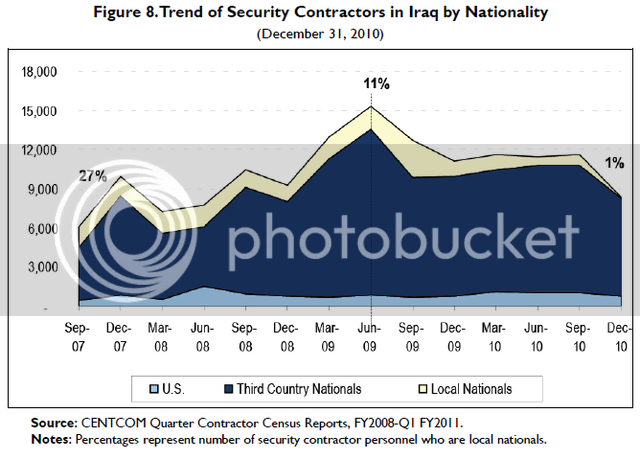 Incidents of abuse still occur in Afghanistan. From 2006 to 2009, private security contractors escorting supply convoys to coalition bases have been blamed for killing and wounding more than 30 innocent civilians in Afghanistan’s Maywand district alone, leading to at least one confrontation with U.S. forces. And in May 2010, U.S. and Afghan officials reportedly stated that local Afghan security contractors protecting NATO supply convoys in Kandahar “regularly fire wildly into villages they pass, hindering coalition efforts to build local support.” One officer from a Stryker brigade deployed in Afghanistan was quoted as saying that these contractors “tend to squeeze the trigger first and ask questions later.” And unlike in Iraq, where a series of highprofile incidents involved U.S. security personnel, in Afghanistan, many of the guards causing the problems are Afghans.
Recent U.S. government investigations have also found that U.S. money for contracts in Afghanistan have been used to pay the Taliban in exchange for security. The Office of the Inspector General for the U.S. Agency for International Development found that “millions of dollars in American taxpayer funds may have been paid to Taliban fighters in southern Afghanistan to provide security for a U.S. development project.” The Majority report issued by the House Committee on Oversight and Government Reform’s Subcommittee on National Security and Foreign Affairs found similar evidence that U.S. contractors made protection payments to local warlords to secure safe passage of supply convoys. The investigation further found that protection payments may even have gone to the Taliban. And the Senate Armed Services Committee issued a report that found evidence of U.S.-funded prime contractors supporting the Taliban and subcontracting to warlords.
According to many analysts, these events have in fact undermined the U.S. mission in Afghanistan and Iraq. An Iraqi Interior Ministry official, discussing the behavior of private security contractors, said “Iraqis do not know them as Blackwater or other PSCs but only as Americans.” One senior military officer reportedly stated that the actions of armed PSCs “can turn an entire district against us.” Some analysts also contend that PSCs can be a direct threat to the legitimacy of the local government. These analysts argue that if counterinsurgency operations are a competition for legitimacy but the government is allowing armed contractors to operate in the country without the contractors being held accountable for their actions, then the government itself can be viewed as not legitimate in the eyes of the local population. These analysts point to the recent court decision dismissing the case against former Blackwater employees as a case in point where the legitimacy of the U.S. and local government is being undermined by the actions of PSCs.
The perception that DOD and other government agencies are deploying PSCs who abuse and mistreat people can fan anti-American sentiment and strengthen insurgents, even when no abuses are taking place. There have been reports of an anti-American campaign in Pakistan, where stories are circulating of U.S. private security contractors running amok and armed Americans harassing and terrifying residents. U.S. efforts can also be undermined when DOD has ties with groups that kill civilians or government officials, even if the perpetrators were not working for DOD when the killings took place. In June 2009, the provincial police chief of Kandahar, Afghanistan, was killed by a group that worked as a private security contractor for DOD.
Pointing to the example of the killing of the police chief in Kandahar, some analysts have also argued that the large-scale use of armed contractors in certain countries can undermine the stability of fragile governments. In a paper for the U.S. Army War College, Colonel Bobby A. Towery wrote:
Incidents of abuse still occur in Afghanistan. From 2006 to 2009, private security contractors escorting supply convoys to coalition bases have been blamed for killing and wounding more than 30 innocent civilians in Afghanistan’s Maywand district alone, leading to at least one confrontation with U.S. forces. And in May 2010, U.S. and Afghan officials reportedly stated that local Afghan security contractors protecting NATO supply convoys in Kandahar “regularly fire wildly into villages they pass, hindering coalition efforts to build local support.” One officer from a Stryker brigade deployed in Afghanistan was quoted as saying that these contractors “tend to squeeze the trigger first and ask questions later.” And unlike in Iraq, where a series of highprofile incidents involved U.S. security personnel, in Afghanistan, many of the guards causing the problems are Afghans.
Recent U.S. government investigations have also found that U.S. money for contracts in Afghanistan have been used to pay the Taliban in exchange for security. The Office of the Inspector General for the U.S. Agency for International Development found that “millions of dollars in American taxpayer funds may have been paid to Taliban fighters in southern Afghanistan to provide security for a U.S. development project.” The Majority report issued by the House Committee on Oversight and Government Reform’s Subcommittee on National Security and Foreign Affairs found similar evidence that U.S. contractors made protection payments to local warlords to secure safe passage of supply convoys. The investigation further found that protection payments may even have gone to the Taliban. And the Senate Armed Services Committee issued a report that found evidence of U.S.-funded prime contractors supporting the Taliban and subcontracting to warlords.
According to many analysts, these events have in fact undermined the U.S. mission in Afghanistan and Iraq. An Iraqi Interior Ministry official, discussing the behavior of private security contractors, said “Iraqis do not know them as Blackwater or other PSCs but only as Americans.” One senior military officer reportedly stated that the actions of armed PSCs “can turn an entire district against us.” Some analysts also contend that PSCs can be a direct threat to the legitimacy of the local government. These analysts argue that if counterinsurgency operations are a competition for legitimacy but the government is allowing armed contractors to operate in the country without the contractors being held accountable for their actions, then the government itself can be viewed as not legitimate in the eyes of the local population. These analysts point to the recent court decision dismissing the case against former Blackwater employees as a case in point where the legitimacy of the U.S. and local government is being undermined by the actions of PSCs.
The perception that DOD and other government agencies are deploying PSCs who abuse and mistreat people can fan anti-American sentiment and strengthen insurgents, even when no abuses are taking place. There have been reports of an anti-American campaign in Pakistan, where stories are circulating of U.S. private security contractors running amok and armed Americans harassing and terrifying residents. U.S. efforts can also be undermined when DOD has ties with groups that kill civilians or government officials, even if the perpetrators were not working for DOD when the killings took place. In June 2009, the provincial police chief of Kandahar, Afghanistan, was killed by a group that worked as a private security contractor for DOD.
Pointing to the example of the killing of the police chief in Kandahar, some analysts have also argued that the large-scale use of armed contractors in certain countries can undermine the stability of fragile governments. In a paper for the U.S. Army War College, Colonel Bobby A. Towery wrote:
 AFGHANISTAN CONTRACTORS
According to DOD, as of December 2010, there were 18,919 private security contractor personnel in Afghanistan. This represents the highest recorded number of private security contractor personnel used by DOD in any conflict in the history of the United States.
AFGHANISTAN CONTRACTORS
According to DOD, as of December 2010, there were 18,919 private security contractor personnel in Afghanistan. This represents the highest recorded number of private security contractor personnel used by DOD in any conflict in the history of the United States.
 From December 2008 to December 2010, the number of U.S. troops and DOD contractor personnel in Afghanistan increased. However, the number of security contractors increased at a much faster rate (413%) than total contractors (22%) or troop levels (200%). As of December 2010, security contractor personnel made up 22% of all DOD contractors and was equal to 20% of the size of total U.S. troop presence in Afghanistan (see Figure 3).
From December 2008 to December 2010, the number of U.S. troops and DOD contractor personnel in Afghanistan increased. However, the number of security contractors increased at a much faster rate (413%) than total contractors (22%) or troop levels (200%). As of December 2010, security contractor personnel made up 22% of all DOD contractors and was equal to 20% of the size of total U.S. troop presence in Afghanistan (see Figure 3).
 According to DOD, from June 2009 to November 2010, 319 private security contractor personnel working for DOD have been killed in action in Afghanistan, compared to 626 U.S. troops killed in action over the same period. Adjusting for the difference in the number of PSC personnel compared to troops, a PSC employee working for DOD in Afghanistan is 2.75 times more likely to be killed in action than uniformed personnel (see Figure 4).
More contractor security personnel were killed in action providing mobile security (233 people or 73% of fatalities) than static security, even though those providing mobile security are only 25%- 30% of the total PSC workforce.
According to DOD, from June 2009 to November 2010, 319 private security contractor personnel working for DOD have been killed in action in Afghanistan, compared to 626 U.S. troops killed in action over the same period. Adjusting for the difference in the number of PSC personnel compared to troops, a PSC employee working for DOD in Afghanistan is 2.75 times more likely to be killed in action than uniformed personnel (see Figure 4).
More contractor security personnel were killed in action providing mobile security (233 people or 73% of fatalities) than static security, even though those providing mobile security are only 25%- 30% of the total PSC workforce.

 IRAQ CONTRACTORS
According to DOD, as of December 2010, there were 8,327 private security contractor personnel working for DOD in Iraq - the fewest number of such personnel since June, 2008. Local nationals made up just 1% of all security personnel, compared to 95% in Afghanistan (see Table 2).
IRAQ CONTRACTORS
According to DOD, as of December 2010, there were 8,327 private security contractor personnel working for DOD in Iraq - the fewest number of such personnel since June, 2008. Local nationals made up just 1% of all security personnel, compared to 95% in Afghanistan (see Table 2).
 As the military continues to withdraw from Iraq, the Department of State will assume greater responsibility for providing security and will have to hire more PSC personnel. It is estimated that the number of security contractors working for State will increase to approximately 5,500, with some 1,500 providing personal security for diplomatic movements and an additional 4,000 providing perimeter security.
As the military continues to withdraw from Iraq, the Department of State will assume greater responsibility for providing security and will have to hire more PSC personnel. It is estimated that the number of security contractors working for State will increase to approximately 5,500, with some 1,500 providing personal security for diplomatic movements and an additional 4,000 providing perimeter security.

 Incidents of abuse still occur in Afghanistan. From 2006 to 2009, private security contractors escorting supply convoys to coalition bases have been blamed for killing and wounding more than 30 innocent civilians in Afghanistan’s Maywand district alone, leading to at least one confrontation with U.S. forces. And in May 2010, U.S. and Afghan officials reportedly stated that local Afghan security contractors protecting NATO supply convoys in Kandahar “regularly fire wildly into villages they pass, hindering coalition efforts to build local support.” One officer from a Stryker brigade deployed in Afghanistan was quoted as saying that these contractors “tend to squeeze the trigger first and ask questions later.” And unlike in Iraq, where a series of highprofile incidents involved U.S. security personnel, in Afghanistan, many of the guards causing the problems are Afghans.
Recent U.S. government investigations have also found that U.S. money for contracts in Afghanistan have been used to pay the Taliban in exchange for security. The Office of the Inspector General for the U.S. Agency for International Development found that “millions of dollars in American taxpayer funds may have been paid to Taliban fighters in southern Afghanistan to provide security for a U.S. development project.” The Majority report issued by the House Committee on Oversight and Government Reform’s Subcommittee on National Security and Foreign Affairs found similar evidence that U.S. contractors made protection payments to local warlords to secure safe passage of supply convoys. The investigation further found that protection payments may even have gone to the Taliban. And the Senate Armed Services Committee issued a report that found evidence of U.S.-funded prime contractors supporting the Taliban and subcontracting to warlords.
According to many analysts, these events have in fact undermined the U.S. mission in Afghanistan and Iraq. An Iraqi Interior Ministry official, discussing the behavior of private security contractors, said “Iraqis do not know them as Blackwater or other PSCs but only as Americans.” One senior military officer reportedly stated that the actions of armed PSCs “can turn an entire district against us.” Some analysts also contend that PSCs can be a direct threat to the legitimacy of the local government. These analysts argue that if counterinsurgency operations are a competition for legitimacy but the government is allowing armed contractors to operate in the country without the contractors being held accountable for their actions, then the government itself can be viewed as not legitimate in the eyes of the local population. These analysts point to the recent court decision dismissing the case against former Blackwater employees as a case in point where the legitimacy of the U.S. and local government is being undermined by the actions of PSCs.
The perception that DOD and other government agencies are deploying PSCs who abuse and mistreat people can fan anti-American sentiment and strengthen insurgents, even when no abuses are taking place. There have been reports of an anti-American campaign in Pakistan, where stories are circulating of U.S. private security contractors running amok and armed Americans harassing and terrifying residents. U.S. efforts can also be undermined when DOD has ties with groups that kill civilians or government officials, even if the perpetrators were not working for DOD when the killings took place. In June 2009, the provincial police chief of Kandahar, Afghanistan, was killed by a group that worked as a private security contractor for DOD.
Pointing to the example of the killing of the police chief in Kandahar, some analysts have also argued that the large-scale use of armed contractors in certain countries can undermine the stability of fragile governments. In a paper for the U.S. Army War College, Colonel Bobby A. Towery wrote:
Incidents of abuse still occur in Afghanistan. From 2006 to 2009, private security contractors escorting supply convoys to coalition bases have been blamed for killing and wounding more than 30 innocent civilians in Afghanistan’s Maywand district alone, leading to at least one confrontation with U.S. forces. And in May 2010, U.S. and Afghan officials reportedly stated that local Afghan security contractors protecting NATO supply convoys in Kandahar “regularly fire wildly into villages they pass, hindering coalition efforts to build local support.” One officer from a Stryker brigade deployed in Afghanistan was quoted as saying that these contractors “tend to squeeze the trigger first and ask questions later.” And unlike in Iraq, where a series of highprofile incidents involved U.S. security personnel, in Afghanistan, many of the guards causing the problems are Afghans.
Recent U.S. government investigations have also found that U.S. money for contracts in Afghanistan have been used to pay the Taliban in exchange for security. The Office of the Inspector General for the U.S. Agency for International Development found that “millions of dollars in American taxpayer funds may have been paid to Taliban fighters in southern Afghanistan to provide security for a U.S. development project.” The Majority report issued by the House Committee on Oversight and Government Reform’s Subcommittee on National Security and Foreign Affairs found similar evidence that U.S. contractors made protection payments to local warlords to secure safe passage of supply convoys. The investigation further found that protection payments may even have gone to the Taliban. And the Senate Armed Services Committee issued a report that found evidence of U.S.-funded prime contractors supporting the Taliban and subcontracting to warlords.
According to many analysts, these events have in fact undermined the U.S. mission in Afghanistan and Iraq. An Iraqi Interior Ministry official, discussing the behavior of private security contractors, said “Iraqis do not know them as Blackwater or other PSCs but only as Americans.” One senior military officer reportedly stated that the actions of armed PSCs “can turn an entire district against us.” Some analysts also contend that PSCs can be a direct threat to the legitimacy of the local government. These analysts argue that if counterinsurgency operations are a competition for legitimacy but the government is allowing armed contractors to operate in the country without the contractors being held accountable for their actions, then the government itself can be viewed as not legitimate in the eyes of the local population. These analysts point to the recent court decision dismissing the case against former Blackwater employees as a case in point where the legitimacy of the U.S. and local government is being undermined by the actions of PSCs.
The perception that DOD and other government agencies are deploying PSCs who abuse and mistreat people can fan anti-American sentiment and strengthen insurgents, even when no abuses are taking place. There have been reports of an anti-American campaign in Pakistan, where stories are circulating of U.S. private security contractors running amok and armed Americans harassing and terrifying residents. U.S. efforts can also be undermined when DOD has ties with groups that kill civilians or government officials, even if the perpetrators were not working for DOD when the killings took place. In June 2009, the provincial police chief of Kandahar, Afghanistan, was killed by a group that worked as a private security contractor for DOD.
Pointing to the example of the killing of the police chief in Kandahar, some analysts have also argued that the large-scale use of armed contractors in certain countries can undermine the stability of fragile governments. In a paper for the U.S. Army War College, Colonel Bobby A. Towery wrote:
“After our departure, the potential exists for us to leave Iraq with paramilitary organizations that are well organized, financed, trained and equipped. These organizations are primarily motivated by profit and only answer to an Iraqi government official with limited to no control over their actions. These factors potentially make private security contractors a destabilizing influence in the future of Iraq.”
These and other considerations have led a number of analysts, government officials, and military officers to call for limiting the use of PSCs in combat and stability operations. Some analysts have called for completely barring the use of PSCs during such operations. The executive summary for the U.S. Naval Academy’s 9th Annual McCain Conference on Ethics and Military Leadership takes this position:
“We therefore conclude that contractors should not be deployed as security guards, sentries, or even prison guards within combat areas. PSCs should be restricted to appropriate support functions and those geographic areas where the rule of law prevails. In irregular warfare (IW) environments, where civilian cooperation is crucial, this restriction is both ethically and strategically necessary.”
Others have suggested a more targeted approach, such as limiting DOD’s use of PSCs to providing only static security in combat areas, leaving all convoy and personal security details to the military.